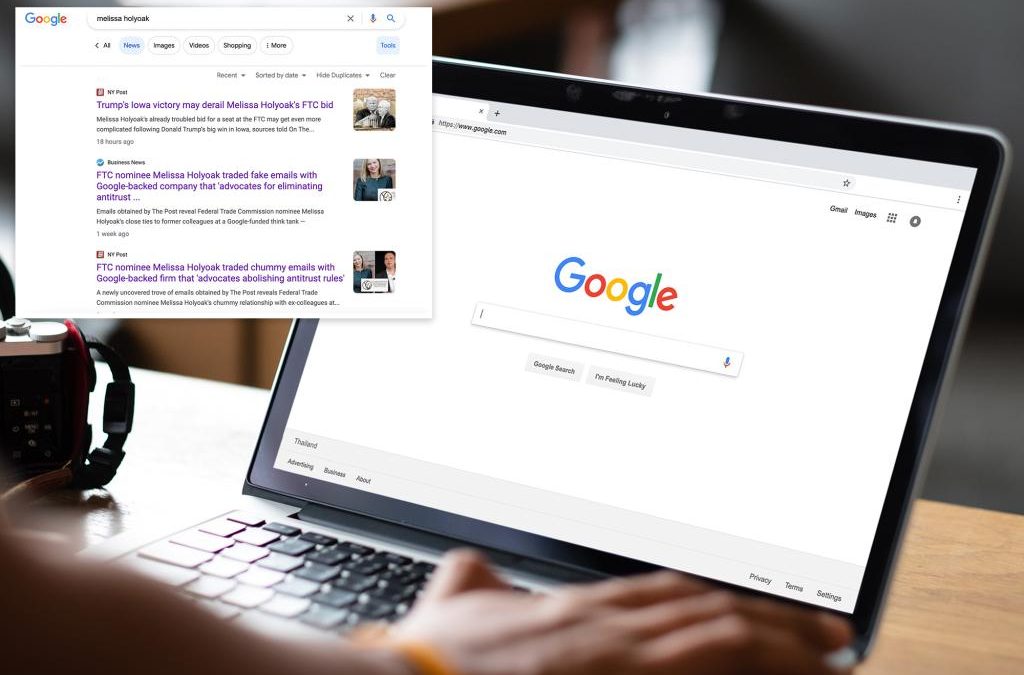Google News searches turn up AI-generated articles that brazenly steal from legitimate media outlets – and The Post has already identified at least one such ripoff of its own published work.
Late last week, The Post tested Google News by searching for recent articles about Federal Trade Commission nominee Melissa Holyoak and sorting the results by most recent date of publication.
The Post’s exclusive Jan. 8 story about Holyoak was listed lower in search results than a nearly identical ripoff – published by an outlet with the generic name “Business News” and the bizarre domain address “biz.crast.net” that seemingly cranks out troves of AI-generated articles.
The fake version of the article featured the same artwork – and even included references to “The Post” in its regurgitated copy. The ripoff is attributed to “Shawn Johnson,” whose byline turned up more than 17,800 pages of results and published dozens of articles last Friday alone.
By late afternoon on Friday, a Google spokesperson confirmed the article “violates our policy and will be removed.”
Google also confirmed that AI-generated content is not against its policies, but that content can be removed if it is determined to be “spam” that was published specifically to rank high in News results.
Independent outlet 404 Media called out the issue last week after obtaining screenshots that showed AI-generated ripoffs – including regurgitations of a “Star Wars”-related post published by Distractify and an article published by Heavy.com about an “execution-style murder” – appearing alongside real articles in Google News search results.
The spread of AI-generated articles is already a “real problem” for the industry, according to Danielle Coffey, CEO of the News/Media Alliance.
“It’s a broken system because it’s not rewarding the quality human-created content across the board.” Coffey told The Post. “It’s going to create conditions where it’s going to be impossible to generate any revenue to keep our newsrooms afloat.”
Coffey was one of several experts who testified before a Senate panel earlier this month on the dangers AI could pose to the future of journalism. At the same event, Conde Nast CEO Roger Lynch said AI chatbots are “built with stolen goods” and should be regulated by Congress.
The proliferation of AI-generated news content alongside real articles on a platform operated by Google — which controls 90% of the online search market — is “deeply concerning,” according to Jason Kint, CEO of Digital Content Next.
“Google exerts extraordinary market power in which news brands get discovered and funded for the American public,” Kint said. “AI is a tool and probably shouldn’t be seen as the villain here — but instead a risk accelerant when gatekeeper power is left unchecked.”
As The Post has reported, media outlets have expressed outrage in recent months over the use of AI-powered chatbots, such as OpenAI’s ChatGPT, to lift copyrighted work without proper credit or compensation.
Last month, the New York Times filed a major copyright infringement lawsuit to protect its business model, while others are locked in intense negotiations to secure payment for their content through licensing deals.
404 Media’s report cited several specific examples of blatant ripoffs in which it said Google was “boosting” seemingly AI-powered sites regurgitated posts featuring identical or near-identical headlines, photos and text as articles from real media outlets.
The outlet said the examples in Google News were found by searching for the relevant topic and setting search parameters to content published in the last 24 hours.
“The presence of AI-generated content on Google News signals two things: first, the black box nature of Google News, with entry into Google News’ rankings in the first place an opaque, but apparently gameable, system,” 404 Media’s Joseph Cox wrote.
“Second, is how Google may not be ready for moderating its News service in the age of consumer-access AI, where essentially anyone is able to churn out a mass of content with little to no regard for its quality or originality,” Cox added.
Google search liaison Danny Sullivan questioned the report’s methodology in a lengthy X thread, asserting that sorting search results by date was “expressingly asking our systems to ignore the regular relevance ranking.”
A Google spokesperson also pushed back on the report’s findings in a statement to The Post.
“Claiming that these sites were featured prominently in Google News is not accurate – the sites in question only appeared for artificially narrow queries, including queries that explicitly filtered out the date of an original article,” the spokesperson said in a statement.
“We take the quality of our results extremely seriously and have clear policies against content created for the primary purpose of ranking well on News and we remove sites that violate it,” the Google spokesperson added.
Google also argued it isn’t fair to claim an article is being “boosted” just because it appeared as a result in response to a specific user request.
When reached for comment, 404 Media’s Cox fired back, stating his article was “clear” and “does not contain factual inaccuracies.”
404 Media co-founder Jason Koebler also defended the report in a statement, asserting that “normal search terms with no time limitations still surface this content in Google News above the sites that they are ripping off.”
Source




